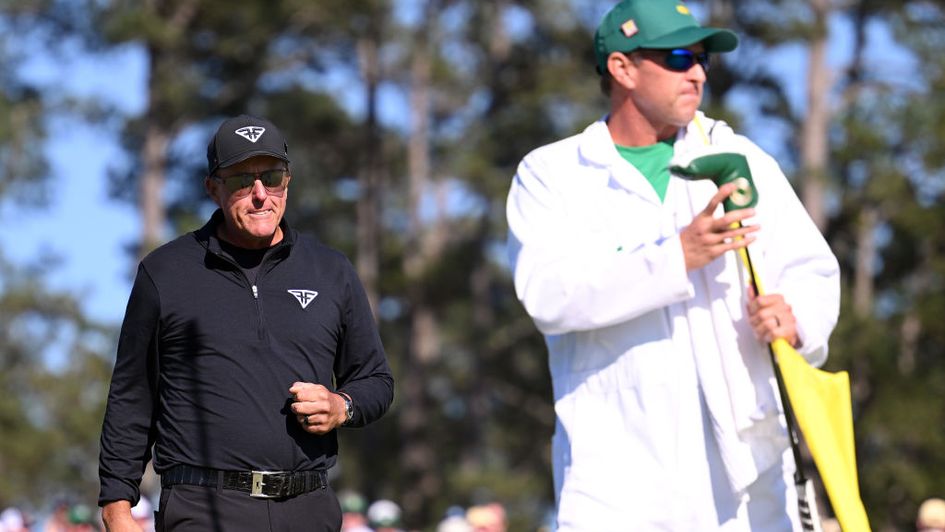Depending on your point of view, the Masters leaderboard was either the absolute validation of LIV Golf, or proof that even its noisiest provocateur doesn’t care about it.
In finishing second at Augusta National, Phil Mickelson either legitimised or undermined the ‘scary motherf*ckers’ he’d chosen to represent.
The truth is bang in the middle: it told us almost nothing.
Mickelson's form on the LIV Golf circuit has been virtually nonexistent. When he stepped away from it to play in the Masters he was conciliatory. During LIV’s event in Oklahoma last week, he was once again incendiary. His performances shadow his behaviour: tweet something pathetic, play pathetically. Perhaps officials at Augusta took his phone away.
For someone like Brooks Koepka, there is no argument: he has taken LIV Golf seriously enough to be its star and, buoyed by better health, brought his formerly dominant self back to life in the Masters. There remains a question mark where once there wasn’t, about how he plays when the opportunity to win a major is there, but this is a world-class golfer who has no interest in the ongoing war between organisations. One suspects he feels he’s ended up on the wrong side of it but had little choice in the end.
Patrick Reed's runner-up finish in Dubai had reminded us of how much his career has benefited from the accusations which have coloured it. However much he protests, however many people he fails to sue, Reed is better when he thinks the world is against him. That's something he has to go without in front of largely sympathetic LIV crowds, now one of a band of mercenaries rather than the black sheep. It's little wonder his game suffered until he went back behind enemy lines.
The LIV Golf players who helped fill the top five are all outstanding, all comfortable at Augusta. The breakaway circuit has a handful of those. And while it’s easy — and often quite fun — to joke about where they make their livings now, professional golfers are for the most part attuned to hitting balls and striving for golfing perfection even if it can never be found.
They are also individuals and there are exceptions to whatever rule you choose to write. For instance it wasn’t surprising to learn that Thomas Pieters arrived late to Oklahoma; they can pay him the world and they won’t get much more than a tweet from a member of his team about how much he’s enjoying being a member of whichever team he wound up on.
Dustin Johnson’s performance in that event won’t change the fact that he will now treat the off-season as exactly that, an excuse to fish or jet ski or whatever he does by night these days. We’ll find out over the next two months whether he really has turned the dial back up in time to better some so-so major performances since he compromised his prospects of one day being remembered in the way he deserves.
As for the European legends, as they once would have been reasonably described, things are altogether uglier. No doubt they feel like they have been let down by a tour they served when it suited them. That tour will also feel it has been betrayed, its future Ryder Cup succession planning shredded alongside half a dozen reputations. Augusta didn’t tell us anything about these players because each of them retired from major championships last year. Paul Casey can count himself fortunate to have been invited back for a farewell, an act of generosity from the PGA of America that Mickelson seems to have conveniently ignored.
Another big issue the Masters failed to get to the bottom of relates more to the future than to these players of the past: to what extent will those we know less about have their careers shaped by playing on the LIV Golf circuit. How will Joaquin Niemann develop now the scrappy kid from Chile no longer has to scrap? Was Mito Pereira's first chance to win a major also his last? Will Matt Wolff ever scale the same heights as Collin Morikawa and Viktor Hovland? How will the perceived ill treatment of Talor Gooch affect his future? Are LIV Golf’s younger stars capable of becoming elite players; would they have do so had they chosen a different path?
Major championships used to answer one question above all. For the time being, they will be seen to be answering more, yet the likelihood of anything conclusive is slimmer than the tweetomime villain who returns to the PGA Championship for the first time since winning it. His scintillating run at the Masters didn't even tell us that LIV Golf would gleefully call his success their own, because Greg Norman had promised that before the tournament, lying through his teeth to suggest all the organisation's players would invade the 18th green in the event of a LIV victory.
Johnson or Koepka or Cam Smith or someone else might manage to win the PGA Championship. Should any of them do so it would be a huge PR boost to an organisation built for that purpose, but it would no more belong to LIV Golf than Jon Rahm's Masters win belongs to the PGA Tour. Try as they might to convince you otherwise, these players know as well as anyone that golf is for the most part an individual sport. It was the extraordinary talents of three players which saw them play so well in the Masters, and it will be a blend of talent and timing which determines who lifts the Wanamaker Trophy.
